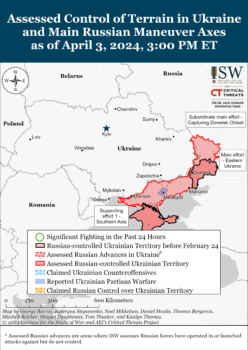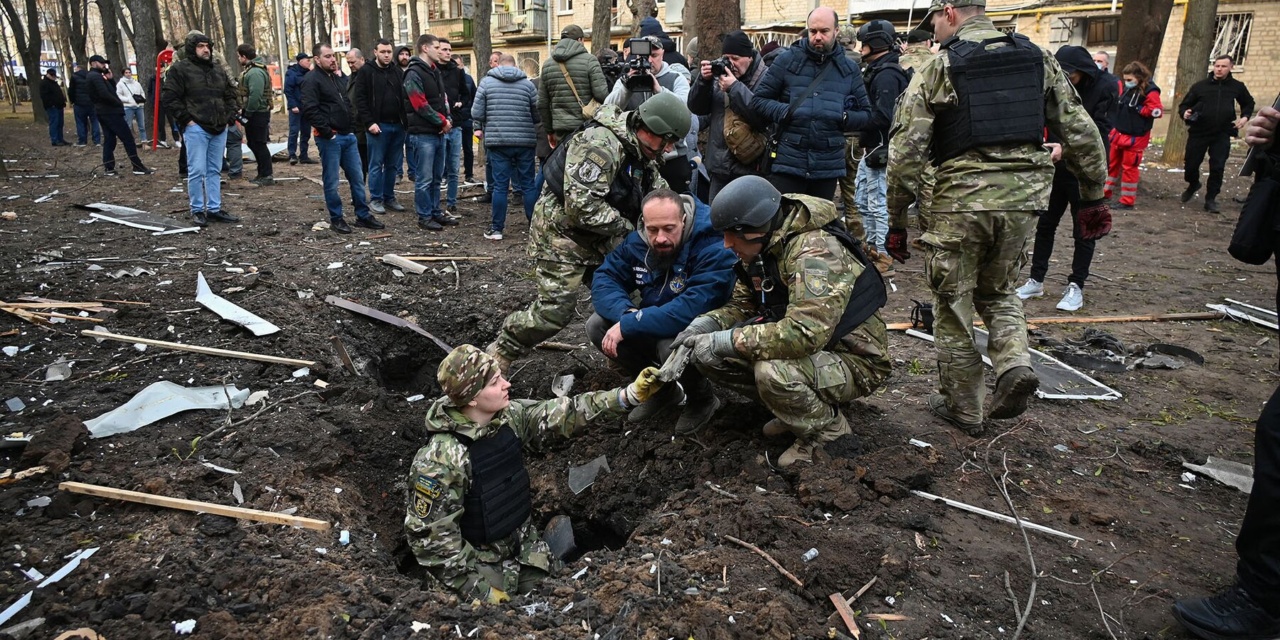Ukrainian law enforcement officers examine damage from Russian missile strikes on Kharkiv in northeast Ukraine on March 27 2024 (Sergey Bobok/AFP/Getty)
Tuesday’s Coverage: EU Approves Plan For €50 Billion in Aid to Kyiv

Map: Institute for the Study of War
UPDATE 1420 GMT:
Denmark has announced its 17th package of military aid, worth DKK2.2 billion ($313 million), to Ukraine.
The funds will “strengthen maritime capabilities, ammunition and drones, and production of missile components”.
UPDATE 1311 GMT:
The death toll has risen to at least 14 from the Russian missile strike on Chernihiv city in northern Ukraine.
A 25-year-old policewoman on sick leave was among those killed after she suffered a severe shrapnel injury.
Two children are among the 61 injured. Three people have been rescued from the rubble, and first responders are searching for more.
Germany’s Ambassador to Ukraine, Martin Jaeger, posted:
Another morning in Ukraine with air raids and rocket attacks. Eleven dead, many injured in an attack on Chernihiv. Russia is terrorizing the civilian population. More air defense is needed. Germany supplies an additional patriot system. Other partners must follow. https://t.co/BWjr47KYRb
— Martin Jaeger (@MJaegerT) April 17, 2024
UPDATE 0951 GMT:
The death toll has risen to at least 10 from this morning’s Russian missile strike on a residential neighborhood in the Chernihiv region.
About 20 other civilians are wounded.
Ukraine President Volodymyr Zelenskiy has chided the international community, “This would not have happened if Ukraine had received sufficient air defense equipment and if the world’s determination to counter Russian terror had been sufficient.”
Chernihiv. A rescue operation is underway following a Russian missile strike. There are people under the rubble. As of now, 20 people are reported to have been injured and ten killed. My condolences to their close ones.
Unfortunately, the death toll may still rise. This would… pic.twitter.com/0t7QybrNk6
— Volodymyr Zelenskyy / Володимир Зеленський (@ZelenskyyUa) April 17, 2024
UPDATE 0823 GMT:
Austria’s Raiffeisen Bank International posted dozens of advertisements for Russia-based jobs, contradicting its official pledge to leave the Russian market.
One job posting, issued by the bank’s unit for medium-sized businesses in Russia, said “key goals are a multiple expansion of the active client base and stable double-digit income growth”. Raiffeisen is “looking for a client manager who will attract clients”, an ad from the division targeting small businesses in Russia outlines. Another notes that the company is “actively expanding our base of corporate clients” for payroll services.
Soon after Vladimir Putin’s invasion of Ukraine, Raiffeisen said it intended to reduce and sell its business in Russia. Two years on, the bank is the western lender with the largest operations in Russia. It is under scrutiny by officials at the US Treasury Department and has been under pressure from the European Central Bank.
After the revelations in the Financial Times, Raiffeisen said it has launched an internal inquiry. The ads have been withdrawn.
The company said in a statement:
The reduction of the Russian business will continue in 2024. Raiffeisen continued to work on a potential transaction, a sale or a spin-off, which would result in the de-consolidation of Raiffeisenbank Russia from the group.
The [advertisements] do not reflect the measures taken by RBI to reduce its Russian business, nor do they correspond to the future plans for the Russian business.
UPDATE 0809 GMT:
Posting a series of photos, Christopher Miller of the Financial Times documents Russia’s destruction of Bakhmut in the Donetsk region in eastern Ukraine.
Russian forces and mercenaries overran Bakhmut in May 2023 after several months of bombing and “human wave” assaults.
Russia’s occupying forces in Bakhmut just published on one of their Telegram channels new video footage and photos of the eastern Ukrainian city almost a year after it was destroyed and captured. The photos are stomach-churning and I admit they fill me with rage. I’ll post them… pic.twitter.com/3BIk9dS3rN
— Christopher Miller (@ChristopherJM) April 16, 2024
And this was the Bakhmut central shopping mall and Silpo grocery store located just in front of the main central market. It was always humming with activity. I did all my shopping here for two years.
Top left photo: under Russian occupation. Next two photos are mine from summer… pic.twitter.com/ckyRccC9RM
— Christopher Miller (@ChristopherJM) April 16, 2024
UPDATE 0805 GMT:
A Russian missile attack on a residential neighborhood in the Chernihiv region in northern Ukraine has killed at least four people and injured several more, according to Acting Mayor Oleksandr Lomako.
UPDATE 0641 GMT:
A BBC Russia investigation documents that several companies in the European Union are circumventing sanctions and supplying parts to Russian military shipyards.
Customs data confirms supplies by the Croatian company Adria Winch, which makes deck equipment for civilian ships and military vessels.
The company has operated in Russia for more than 20 years. It continues to send supplies to Zelenodolsk Shipyard in Tatarstan through its Russian subsidiaries, and it also delivers to Russia through intermediaries in third countries such as Turkey and China.
In 2022, the Croatian company supplied equipment to Russia worth more than €700,000 — 21% of the total volume of its operations.
The former head of Adria Winch, Milivoj Peruzovic, says that sanctions — dating from Russia’s seizure of Crimea in 2014 — “now seem simply laughable”.
The Italian company MELCAL, which specializes in the production of ship cranes, supplied them and associated spare parts for Russia’s armament support ships.
And the Latvian company Marine Systems continues deliveries to Russia, alongside partners who import components for military ships.
UPDATE 0633 GMT:
There were explosions overnight at Russia’s Dzhankoy airbase in occupied Crimea.
A satellite documented six fires on and near the airfield, where attack helicopters are based. The nearby highway was closed to traffic.
A Russian proxy official, Oleg Kryuchkov, insisted, “A gas cylinder installation in a car exploded, there was a malfunction. Cotton has something to do with it.”
UPDATE 0607 GMT:
In February, US Vice President Kamala Harris asked Ukraine President Volodymyr Zelenskiy to halt damaging attacks on Russian oil refineries.
US officials were concerned that the drone strikes, which reduced Russian output by up to 14% this spring, would raise global energy prices and provoke even more aggressive Russian strikes on Ukraine.
“Officials familiar with the matter” says Harris’s request irritated Zelensky and his top aides. The President brushed off the recommendation, as he was uncertain if it reflected the consensus position of the Biden Administration.
So in following weeks, the Administration issued warnings in multiple conversations. Those delivering the messages included National Security Advisor Jake Sullivan, who traveled to Kyiv in March, and senior US defense and intelligence officials.
Ukraine continued the strikes. However, the last one was on April 2 when drones reached Russia’s third-largest refinery, located in Tatarstan about 1,200 miles (744 miles) from the border.
ORIGINAL ENTRY: Interviewing officials and residents, Dan Sabbagh of The Guardian describes the critical situation in Ukraine’s second city Kharkiv, amid intense Russian aerial attacks and limits on international aid.
With Ukrainian air defenses overstretched, Russian missile and drone assaults — including the largest of 2024 on March 22 and 29 — have severely damaged energy infrastructure and targeted residential areas.
The strikes on March 22 destroyed one power plant on the eastern edge of the city and all of its substations, and a second plant 30 miles to the southeast of the city. Power supply in the city is limited to a few hours per day, and was briefly halted entirely during another Russian attack last week.
Gas storage facilities are being targeted. Children are educated either online or in underground schools.
Ukrainian officials, including President Volodymyr Zelenskiy, have been pleading for additional air defense systems. But Trumpists and hard-right Republicans have blocked US aid since last October, and European countries — apart from Germany, which finally committed another Patriot system last week — have been hesitant.
Mayor Ihor Terekhov said the US assistance is of “critical importance for us”.
He compared the situation to that in Syria’s largest city Aleppo, attacked and besieged by Russian and Assad regime forces from the ground and air for six months before it surrendered in December 2016.
See Syria Analysis: “Surrender or Die” — The Importance of the Pro-Assad Sieges
“We need that support to prevent Kharkiv being a second Aleppo,” Terekhov says.
Liubov, a worker at a garment factory, says she is planning to leave her home and live central Ukraine for at least a month to provide a calmer environment for her two daughters.
She explains that Russian bombing has become “much more frequent, much more often”, including the “very, very scary and loud” assault on March 22.
“Attacks could come at daytime or night-time, in any part of the city,” she said bluntly.

